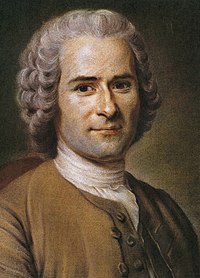It is strongly recommended that you read Pt. I before tackling the conclusion.
So where does
all this talk of cause and effect and everything effecting everything take us?
Even if we are not willing to concede the nonexistence of freedom, we can still
hold on to the philosophy of freedom by embracing a democracy fundamentally opposed
to the government we have now. (I trust we all know that America is not a
democracy, but a representative republic.)
The
American government was founded on principles of freedom. These principles are
murky and serve as the arguments against social programs and civic duty
mandates. This type of freedom encourages individuals to think individualistically
rather than as part of a larger society. The reason for this is to keep
everyone motivated. According to American folklore we are all self interested
people who look after our own interests before looking out for others. That may
be true. It also may be true that the doctrine of self-interest has been
imposed on us, and if the doctrine of a collective identity and helping out fellow
people were preached we’d be going to Washington with torches and pitchforks if
they tried to defund government programs.
 |
| Jean-Jacques Rousseau |
Here me
out. I’ve said before that we are slaves of circumstance, as our environment
largely dictates who we are and the actions we will perform in the future. The only
way for us to collectively control our environment is by dictating the terms of
our lives in regards to all other individuals around us. As it stands, we can
do all the dictating we want, but the negative freedoms of others hamper our ability
to dictate the most important factor in who we become- our situation.
What we
practice now is uncontrolled freedom. Uncontrolled freedom usurps true,
positive freedom. Not only does it turn the collective into shards of
individualism, it also prevents large-scale compromises and a more robust
understanding of the human condition.
We have
sacrificed an inherently altruistic and considerate government for a selfish
and inconsiderate government. There are special interests tearing up the system
and fighting for pieces of the pie while basic human interests are forgotten or
ignored. Special interests are the consequence of the negative liberty we
practice. People who want the same thing from the government mobilize and
influence decision making any way they can. These similar situated individuals
got together and rampaged the government to the point where elected officials
had no choice but to appease the demands of these groups.
The problem with special interests
is that they don’t care how their wants affect the wants of the whole. In a
self-interested society, the groups that the society creates will be
self-interested as well. If everything affects everything, then the plurality
has some widespread consequences that can hurt a lot of people, just as the
actions of one individual can have widespread consequences for all individuals.
This is why a psychological shift in how
we view freedom is a welcome transformation. The freedom to control our
conditions is true freedom. Activating the silent voices in the polity can lead
us into an era of democracy. With all involved in the making of the rules we
are forced to live under, no one group will have undue influence or power over
others. True freedom and true democracy are eternal companions. While neither
may be attainable, it doesn’t mean we shouldn't strive to practice these
principles.
Although we are slaves of
circumstance, democracy offers a way for us to be the slave masters as well.
I blame Ayn Rand.
ReplyDelete